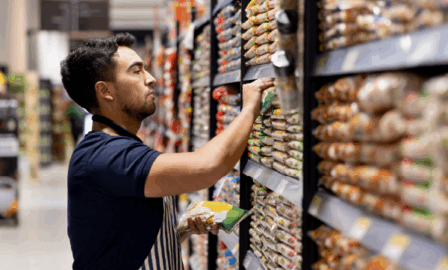What Companies Are Utilizing Their Influencer Marketing Strategy Best?
As purchasing and shopping experiences become increasingly digital, the need for a strong digital marketing strategy is apparent perhaps now more than ever before. While influencer marketing has been around for decades, the industry has more than doubled since 2019. Not only is influencer marketing becoming a “trendy” strategy in marketing, but companies are seeing positive changes in their conversion rates. In fact, 89% of businesses report that their ROI from influencer marketing strategy is comparable to or better than that of their other marketing channels.
Influencer marketing is the “in” form of marketing, not only trending in recent years, but substantially improving companies reach and performance. Easily stated, brands are continuing to capitalize on this highly effective form of marketing. Businesses across industries are engaging in different social platforms with specialized influencers to effectively communicate their message and brand to consumers, ultimately to increase conversion rates and drive purchase.
Brands with a Successful Influencer Marketing Strategy
Below, we highlight companies across the retail, life sciences, and consumer products industries that are successfully utilizing influencers as part of their marketing strategy to drive sales, establish brand loyalty, and more.
Retail Industry
Aerie
Aerie has been extremely successful in their influencer marketing, even recently winning a Glossy for the Best Influencer Campaign in the fashion category. Their success in influencer marketing is due to their #Aeriereal campaign, which displayed unedited photos and non-traditional models highlighting how their clothes truly look on bodies of all sizes. This approach is highly effective because it communicates a more relatable standard for how clothes fit, allowing customers to see themselves represented through authentic and unedited images reflected in the brand’s products.
Levi’s
Levi’s also topped the best influencer marketing list with there sustainability campaign “Buy Better, Wear Longer.” The company teamed up with influencers Emma Chamberlain and Jaden Smith to raise awareness of the waste and overconsumption generated by the fashion industry. The campaign emphasizes the durability of their products and encourages thrifting and second-hand shopping to reduce fashion waste. Their campaign thrived through leveraging relatable and highly visible influencers and highlighting a social issue consumers care about.
Gymshark
Gymshark is a relatively newer fitness clothing brand, getting its start in 2012. A staple brand in many fitness fans’ closets, Gymshark has more than nine million followers on Instagram. Their quick growth over the past 10 years can be credited to their overachieving social media and influencer strategy, along with their large branding on their products. Gymshark understands the wants of its popular market segments of young gym-goers and athletes. They showcase famous athletes and celebrity trainers looking and feeling good in their fitness wear. Gymshark excels at leveraging well-known fitness influencers while incorporating pop-culture driven content.
Consumer Products
Glossier
Glossier, a direct-to-consumer beauty brand that emphasizes simplicity and natural beauty, has become known for their effective use of influencer marketing. Their brand partners with nontraditional and diverse influencers, including micro-influencers and celebrities, who promote Glossier’s products. Also to note, taking the micro-influencer route is often much cheaper than traditional marketing avenues. Glossier has even embraced posting customers’ photos to their Instagram account, leveraging them as their own brand influencers. This is all in efforts to send the message there is no right type of influencer: that Glossier products are for everyone. Through social posts and messaging, Glossier’s influencers focus on content that aligns with Glossier’s values, such as minimalism and inclusivity.
Banza
Banza is a food company that specializes in chickpea pasta and rice. Over the last years, it has effectively utilized influencer marketing to promote their products. Banza initially gained traction when its CEO reached out to high-level influencers to give them free samples. Since then, Banza has made its way to grocery stores around the country. They continue to use trusted fitness and nutrition influencers like celebrity Kristen Bell to endorse the brand, creating content that highlights the health benefits and taste of the product as well as sharing creative recipes and meal ideas.
Olipop
Olipop, a beverage company that offers a healthy alternative to soda, utilizes influencer marketing to raise brand awareness and promote their products. Olipop partners with health and wellness, along with fitness and nutrition influencers to drive awareness of their prebiotic soda. Olipop tapped into the micro-influencer market, with many of their campaign partnerships with small TikTok content creators. These influencers share their experiences with Olipop’s drinks and highlight their nutritional benefits, a lot of the time incorporating Olipop into their “What I Eat in a Day” videos.
Life Sciences
The life sciences industry takes a different route in influencer marketing than traditional CP and retail companies. While influencer marketing is starting to become popular in this industry, the approach is vastly different. Life sciences influencer marketing leverages real doctors, professionals, and patients to advocate for health-related products. Think about it like this, do you want to receive medical advice from the same influencers that specialize in makeup? Consumers want to hear that a product works from a credible and reputable source. In fact, a study shows that 85% of consumers said they would be at least somewhat to very receptive to an ad from a patient influencer. As such, if correctly used, influencer marketing can be a useful tool to drive awareness, even in pharma.
Dexcom
Dexcom is a glucose monitoring device that individuals with diabetes use to manage their blood sugar. The brand has thrived with their partnerships with athletes, healthcare professionals, and influencers living with diabetes. Their most popular advocate, Nick Jonas, a celebrity who has Type 1 Diabetes, was even seen in a commercial in the latest Superbowl. This Superbowl campaign alone was extremely successful with a 482% increase in leads and a 387% lift in web traffic. Influencers, like Jonas, provide insights into how Dexcom’s products have helped them manage their diabetes effectively, showcasing the accuracy and ease of use of the products.
Midol
Midol is a menstrual pain relief product that operates under the enterprise of Bayer life sciences products. Midol released their “Live Life M-Powered” digital media campaign, which leveraged online videos and influencers to target and empower a younger audience and provide education about menstrual health. They partner with influencers such as lifestyle bloggers, wellness advocates, and healthcare professionals to communicate on their platforms various tips for pain reduction and the importance of self-care during menstruation.
The Future of Influencer Marketing
Influencer marketing has become an essential part of modern-day advertising and brand promotion. When used correctly, it can take your marketing strategy to the next level. Factors such as knowing your consumer base and having proficiency in types of social media platforms are crucial when implementing an influencer marketing campaign. Influencers can create authentic content that resonates with their followers, which can significantly impact a brand’s reach, reputation, and sales. However, tapping into the right influencers and platforms is key to being successful. Moving forward in optimizing your marketing strategies, consider partnering with trusted marketing experts to grow your brand.
Subscribe to Clarkston's Insights
Contributions from Leah Harding



